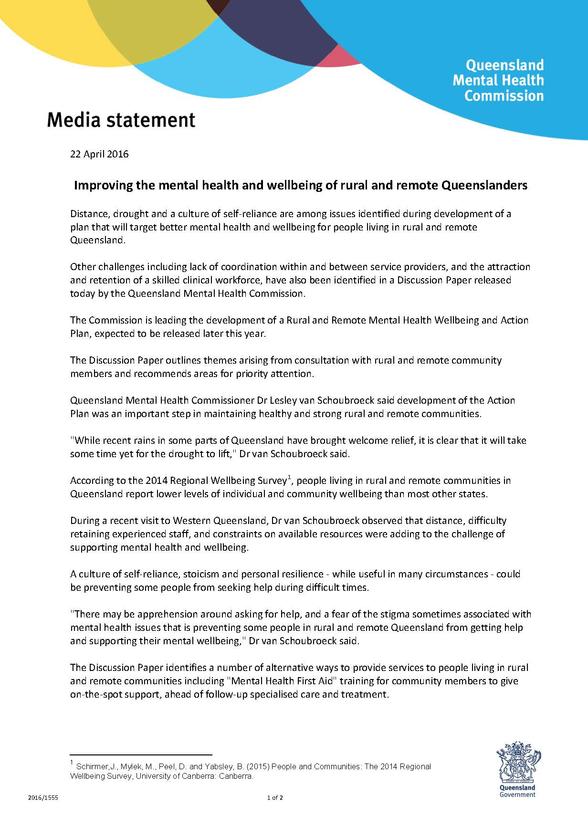Distance, drought and a culture of self-reliance are among issues identified during development of a plan that will target better mental health and wellbeing for people living in rural and remote Queensland.
Other challenges including lack of coordination within and between service providers, and the attraction and retention of a skilled clinical workforce, have also been identified in a Discussion Paper released today by the Queensland Mental Health Commission.
The Commission is leading the development of a Rural and Remote Mental Health Wellbeing and Action Plan, expected to be released later this year.
The Discussion Paper outlines themes arising from consultation with rural and remote community members and recommends areas for priority attention.
Queensland Mental Health Commissioner Dr Lesley van Schoubroeck said development of the Action Plan was an important step in maintaining healthy and strong rural and remote communities.
"While recent rains in some parts of Queensland have brought welcome relief, it is clear that it will take some time yet for the drought to lift," Dr van Schoubroeck said.
According to the 2014 Regional Wellbeing Survey[1], people living in rural and remote communities in Queensland report lower levels of individual and community wellbeing than most other states.
During a recent visit to Western Queensland, Dr van Schoubroeck observed that distance, difficulty retaining experienced staff, and constraints on available resources were adding to the challenge of supporting mental health and wellbeing.
A culture of self-reliance, stoicism and personal resilience - while useful in many circumstances - could be preventing some people from seeking help during difficult times.
"There may be apprehension around asking for help, and a fear of the stigma sometimes associated with mental health issues that is preventing some people in rural and remote Queensland from getting help and supporting their mental wellbeing," Dr van Schoubroeck said.
The Discussion Paper identifies a number of alternative ways to provide services to people living in rural and remote communities including "Mental Health First Aid" training for community members to give on-the-spot support, ahead of follow-up specialised care and treatment.
"General Practitioners are often the first point of contact for consumers experiencing mental health difficulties or problematic substance use," the Discussion Paper said. "However, many rural areas are under-resourced in the primary care sector."
It also identified lack of coordination within and between service providers.
"This may result in long waiting lists, additional travel costs and time away from support networks over multiple days," the Discussion Paper said. "People also report multiple assessments by different service providers which is frustrating for them and seen as unnecessary duplication of effort."
The Discussion Paper is available at the Queensland Mental Health Commission website.
Feedback and comment is sought by 29 April 2016 in order to finalise the Action Plan for release later this year.
[1] Schirmer,J., Mylek, M., Peel, D. and Yabsley, B. (2015) People and Communities: The 2014 Regional Wellbeing Survey, University of Canberra: Canberra.
-
 Rural and Remote Discussion Paper (PDF, 247.32 KB)
Rural and Remote Discussion Paper (PDF, 247.32 KB)

